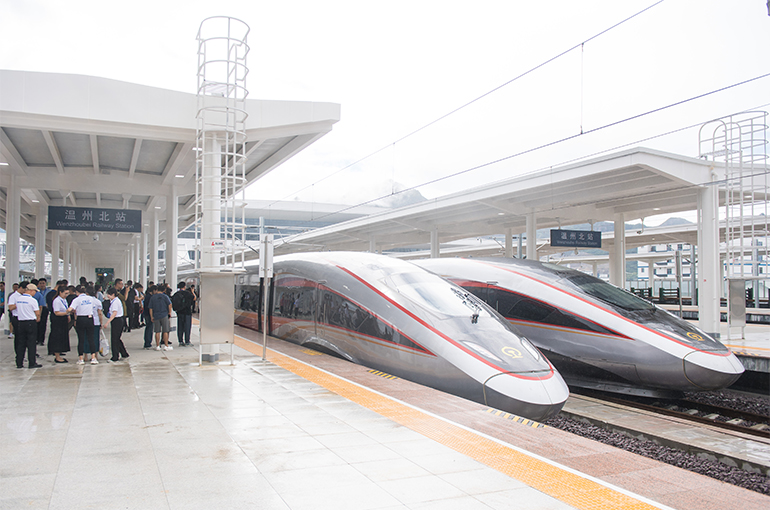 Trains Start Running on China’s Second Privately Owned High-Speed Rail Link
Trains Start Running on China’s Second Privately Owned High-Speed Rail Link(Yicai) Sept. 6 -- China’s second high-speed railway line that is majority-owned by private capital started running today in eastern Zhejiang province, known for its thriving private economy, putting into practice a successful example of mixed-ownership reform in infrastructure.
The Hangzhou-Wenzhou high-speed railway runs 276 kilometers from Hangzhou, the provincial capital, to Wenzhou, an important trading city in the south of the province. It can reach speeds of 350 kilometers an hour and reduces the travel time between the two municipalities to 87 minutes.
The railway line passes through several cities such as Yiwu, known as the world’s capital of small commodities, and will become an important part of the Yangtze River Delta intercity railway network. Ticket prices are set to be based on market mechanisms and shall be adjusted according to real travel demand.
The railway line is 51 percent owned by private enterprise Baisheng United Group and the remainder is held by China Railway, Zhejiang Communications Investment Group and local governments along the railroad. A consortium led by Baisheng serves as the general contractor for the project construction.
It follows the model of the 266.9 kilometer-long Hangzhou-Shaoxing-Taizhou high-speed railway, which was completed in 2020 and was the country’s first high-speed railway controlled by private capital.
The successful operation of the Hangzhou-Wenzhou high-speed railway will encourage the participation of private capital in railway construction projects, thereby broadening the financial channels for railroad infrastructure, the China State Railway Group said today.
The Hangzhou-Wenzhou railway operates under the Build-Own-Operate-Transfer model, with a co-operation period of 34 years, according to the deal signed by Baisheng and the Zhejiang provincial government in 2018. This includes a four-year construction period and a 30-year operation period, during which profits are shared with the investors according to the agreed terms. At the end of the tie-up period, the assets are transferred to the government free of charge.
The Hangzhou-Wenzhou high-speed railway project has created a new railway construction and management model in China, Wang Chang, the head of the Hangzhou-Wenzhou high-speed railway project at the railway department of Zhejiang Development & Planning Institute, told Yicai.
A privately-owned controlling entity serves as the general contractor, while the construction is commissioned to China Railway, Wang said. It serves as a good example of mixed-ownership reform in infrastructure, including railway assets.
The success of Hangzhou-Wenzhou high-speed railway will attract more private enterprises to participate in infrastructure projects, said Wu Sa, deputy director of the Economic Research Institute at the Academy of Macroeconomic Research under the National Development and Reform Commission. This will help create a more competitive, fairer and more efficient market environment in the field of infrastructure construction.
Attracting private capital to participate in major infrastructure projects has always been a key objective of the government. Since the beginning of the year, the NDRC has recommended 3,556 projects in fields from railways to nuclear power to private capital, with investment reaching CNY5 trillion (USD717 billion), according to data from the macro-economic planner.
Editors: Tang Shihua, Kim Taylor